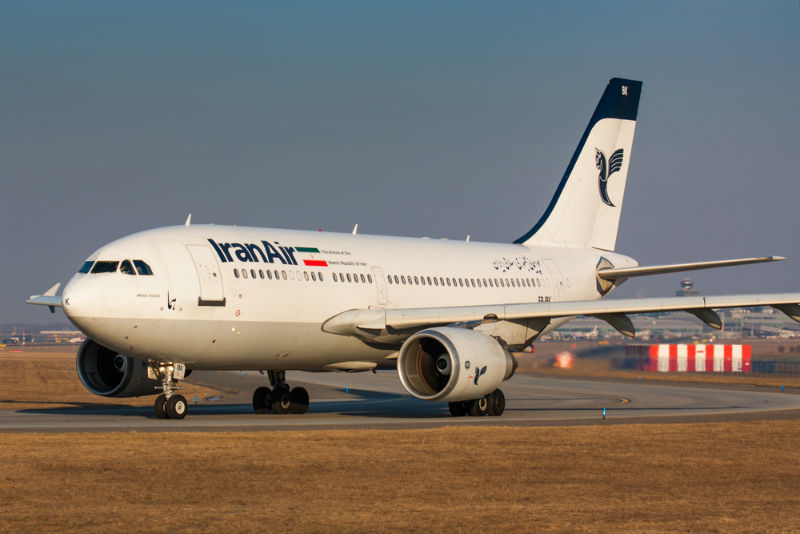Market forces and the choices Iran makes will determine whether it emerges as a competitive regional transportation hub.
Sports and air transport are likely to serve as indicators of whether Iran has the flexibility to become a major player in a globalized world. At the core of Iranian efforts to become a global sports and airline hub will be its willingness to relax strict gender segregation, dress codes and its ban on alcohol.
How Iran deals with the issues of women’s sporting rights, as well as likely demands for relaxed restrictions at its international airports and on board its airlines, will also serve as an indicator of how flexible Iranian hard-liners will be in taking advantage of Iran’s return to the international fold.
The issue of gender segregation at sporting events has already arisen as a result of Iran’s hosting this year of two international volleyball tournaments. Demands for relaxed restrictions in air transportation, however, will emerge as the country prepares to turn Tehran’s Imam Khomeini International Airport and state-owned Iran Air into global hubs that can compete with the airports of Istanbul, Doha, Dubai and Abu Dhabi and their airlines: Turkish Airlines, Qatar Airways, Emirates Airlines and Etihad Airways.
Reform in Sports
Iranian responses to criticism by human rights groups over the banning of women from sports stadiums holds out hope that Iran could prove more flexible than many expect it to be. Human Rights Watch (HRW) quotes executives of the International Volleyball Federation (FIVB) as saying—following a meeting with Iranian Sports and Youth Minister Mahmoud Goudarzi—that progress was possible on the “key aim … of families being able to attend volleyball matches.” Similarly, FIVB General Director Fabio Azevedo said that “discussions are still ongoing and we are hoping for a positive outcome ahead of the FIVB World Tour open event on Kish Island,” which is scheduled to kick off on February 15.
Granting women the right to attend the Kish Island event would have greater symbolic significance, given that volleyball was the last sports bastion that Iranian hard-liners conquered when they pushed through the ban on women in 2012. Volleyball had, until then, been one of the few male sporting events accessible for women.
Based on past experience, however, HRW takes the prospects of a reversal of the ban with a grain of salt.
“Hopeful? That is not enough. Iran promised last June that female fans could attend matches, only to renege and threaten them before the tournament, dashing the hopes of women waiting to return to stadiums,” said Minky Worden.
Worden’s skepticism is reinforced by the fact that caving in to international pressure ahead of this month’s elections for parliament and the Assembly of Experts—the council that elect’s Iran’s spiritual leader—may prove difficult. The bulk of reformist candidates for both councils did not pass muster and were disqualified.
Airline Competition
On the air transport front, Iran has signaled its intention to become a major transportation hub with the signing of a $27 billion agreement with Airbus for the purchase of 118 jets, one of the first major deals since the lifting of nuclear sanctions, as well as contracts to expand Tehran’s international airport. The plane deal includes Airbus A380s, which are part of the fleets of Etihad Airways, Emirates Airlines and Qatar Airways.
“Certainly this is our historical position: we have always been a center for communications in the region,” Iranian Transport Minister Abbas Akhouni told Reuters. Iran Air Chairman Farhad Parvaresh noted: “We used to be a very important airline in the region and globally, so of course we want to play our role fully once again.”
To do so, Iran, despite a domestic passenger market that is expected to grow exponentially, will have to match Arab and Turkish airlines in their willingness not to enforce Islamic law as it regards gender interaction, dress codes and alcohol. The degree to which this is already a debate even among hard-liners is reflected in the fact that some have criticized the Airbus deal for diverting cash from other social and economic priorities.
The outcome of the debate is likely to say much about Iran’s future course. Virtually all commercial agreements signed since the lifting of sanctions have been with state-owned conglomerates with close ties to pension funds and other government agencies such as the Revolutionary Guards Corps, which is widely seen as a pillar of hard-liner factions. The deals also include a $2 billion contract with an Italian steel producer and a $439 million agreement with Peugeot.
Both sports and air transport ambitions will put to the test the Islamic Republic’s strategy to make state-owned companies and state-controlled associations the primary beneficiary of the lifting of sanctions, in the belief that this will allow it to limit Western influences that could come with foreign investment.
“Investments through our big enterprises can be controlled,” said Hamidreza Taraghi, an analyst with close ties to the government, in an interview with The New York Times. Ruling out a complete opening of the Iranian market, Taraghi said “that would provide leverage to Western governments and investors, leverage they would use to influence our politics, culture and society.”
Ultimately, what is likely to determine the outcome of the debate is what price Iran is willing to pay in terms of reigning in its ambitions to uphold its principles. Iran has demonstrated its ability to do so with its resilience during the years that it was subject to punitive sanctions. Nonetheless, it was ultimately willing to negotiate a nuclear deal, even if it drove a hard bargain.
Market forces and the choices Iran makes will determine whether it emerges as a competitive regional transportation hub. When it comes to sports, the onus will be on international sports federations if Iran does not take a first step by lifting the ban on women attending male volleyball matches. A failure to do so would signal that the price for Iran to flout international rules is not yet high enough.
The views expressed in this article are the author’s own and do not necessarily reflect Fair Observer’s editorial policy.
Photo Credit: Sorbis / Rebius / Shutterstock.com
 We bring you perspectives from around the world. Help us to inform and educate. Your donation is tax-deductible. Join over 400 people to become a donor or you could choose to be a sponsor.
We bring you perspectives from around the world. Help us to inform and educate. Your donation is tax-deductible. Join over 400 people to become a donor or you could choose to be a sponsor.
Support Fair Observer
We rely on your support for our independence, diversity and quality.
For more than 10 years, Fair Observer has been free, fair and independent. No billionaire owns us, no advertisers control us. We are a reader-supported nonprofit. Unlike many other publications, we keep our content free for readers regardless of where they live or whether they can afford to pay. We have no paywalls and no ads.
In the post-truth era of fake news, echo chambers and filter bubbles, we publish a plurality of perspectives from around the world. Anyone can publish with us, but everyone goes through a rigorous editorial process. So, you get fact-checked, well-reasoned content instead of noise.
We publish 2,500+ voices from 90+ countries. We also conduct education and training programs
on subjects ranging from digital media and journalism to writing and critical thinking. This
doesn’t come cheap. Servers, editors, trainers and web developers cost
money.
Please consider supporting us on a regular basis as a recurring donor or a
sustaining member.
Will you support FO’s journalism?
We rely on your support for our independence, diversity and quality.








